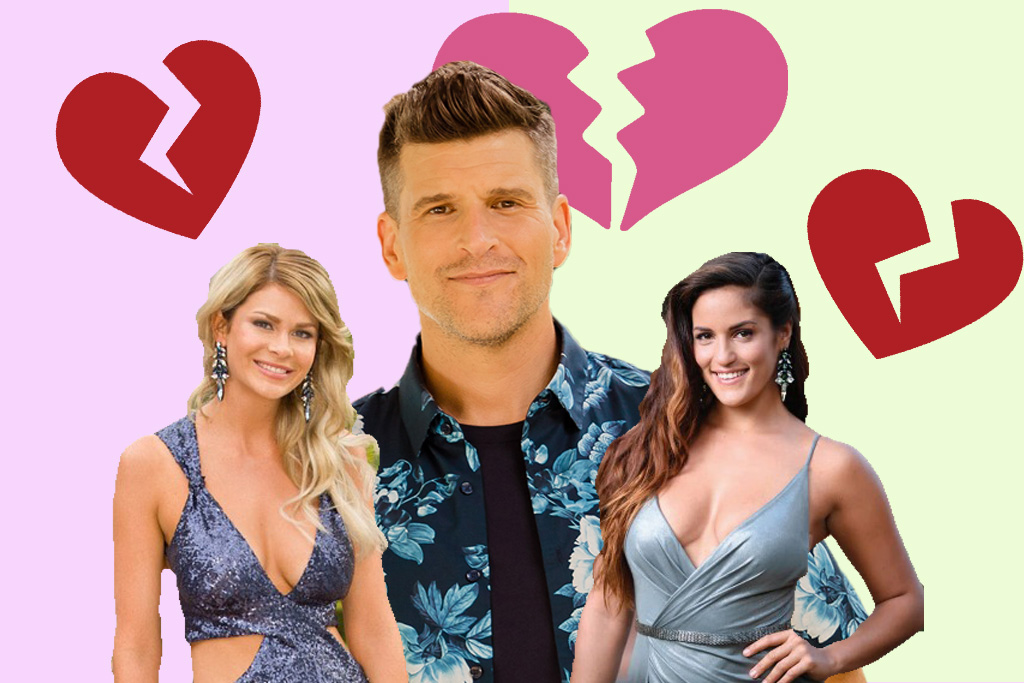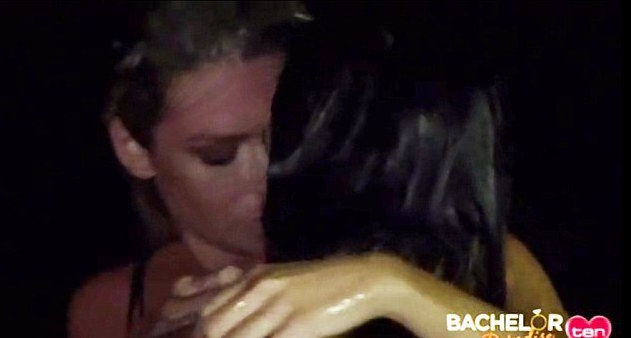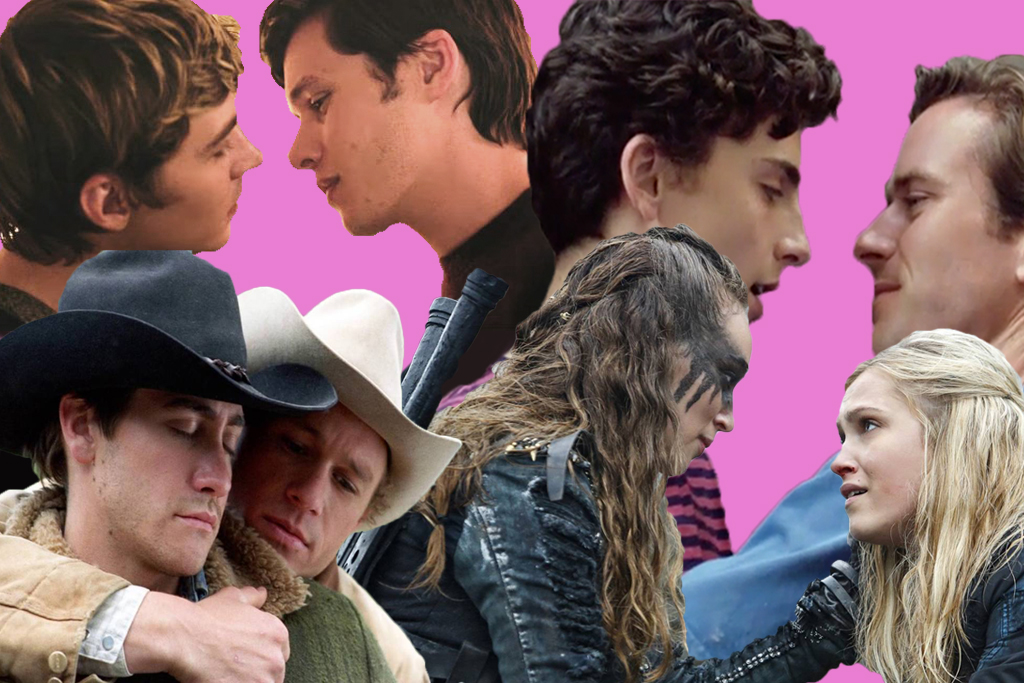We Are Not Your Entertainment: ‘Bachelor In Paradise’ And The Problem With Queerbaiting
Queerbaiting is just a cynical way of manipulating the LGBTQI+ community.

On last night’s episode of Bachelor in Paradise, a “queer” kiss that has been hyped and advertised since the beginning of the show ended up being just another boring straight person pash. And while heterosexual kissing is “technically” fine, the show’s attempt to hoodwink the audience into thinking that two girls were macking on TV has led to accusations of queerbaiting.
Ever since Channel Ten started promoting The Bachelor’s somewhat raunchier spinoff, Bachelor in Paradise, they’ve teased what appears to be the franchise’s first ever on-screen same-sex pairing.
Featured in the pairing was contestant Megan Marx, who is bisexual. The identity of the second participant was unknown, but assumed to be the dark haired fire-twirling Elora.
“She’s absolutely gorgeous, she’s definitely my type of girl,” Marx said in the promo, over footage of fellow contestant Elora Murger. The clip then cuts to grainy footage of Marx making out with someone with long, dark hair. The clear and deliberate implication being that the two women were romantically involved.

But last night it was revealed that the mystery dark-haired woman was actually just a handsome, long-haired male model named Thomas Perras.
Like, good for her actually, but a bunch of queer folk still felt extremely betrayed by the show.
Here's the part of the promo where Channel 10 deliberately cut together Megan talking about Elora with her kiss w/ a long-haired brunette, to make it seem like they were going to deliver a same sex couple. Turns out it was Thomas. Queerbaiting at its finest. #BachelorInParadise pic.twitter.com/ywKqzC0YUb
— Jenna Guillaume (@JennaGuillaume) April 17, 2018
So What Exactly Is Queerbaiting?
Queerbaiting is a term referring to authors, writers, show-runners or producers attempting to attract a queer or queer-friendly audience by hinting at same-sex relationships between characters, but then never actually consummating those relationships. It’s been absolutely rife on television, especially in shows targeted towards a younger demographic, for a while now.
A good example would be the highly publicised and much-hyped kiss between Betty and Veronica in the first season of Riverdale, before the show truly jumped the shark.
The steamy kiss happened in a hot tub (lesbian kisses for straight consumption are apparently best delivered in the water?) and was literally a performative moment in a side plot that was quickly forgotten.
More recently, shows like Supergirl, Gotham and Supernatural have all been accused of queerbaiting too. It happens a lot.
Me to myself when I start a show for the gays knowing that is queerbaiting. pic.twitter.com/3i4Ji66jMC
— × (@zwanheda) April 11, 2018
You could argue that there’s a wag the dog style cause and effect to the problem — if fandoms didn’t push so hard for same-sex relationships in their shows, then writers might stop trying to serve them up. Or — galaxy brain — writers could just actually put more queer relationships on the screen?
It’s actually very simple.
The Bachelor producers queerbaiting us and Australia eating it up:#BachelorInParadiseAU pic.twitter.com/6rigvoIwGo
— Melanie Jones (@MelSpellsTells) April 17, 2018
But Queers On TV Are Good, Right?
Lots of people were extremely excited at the idea of a bisexual Bachelor contestant, and were also happy at the lengths the show took to provide a gender neutral hookup system for Megan Marx, even changing the Rose Ceremony rules so that she wouldn’t be limited by the constraints of the show to only date men.
look i do not like the bachelor but there's a bisexual woman on bachelor in paradise (who was on the bachelor originally and ended up dating one of the other female contestants) and i'm going to watch it now?
— tia ?????? (@Windoq_) March 26, 2018
OMG THERE IS FINALLY AN OPEN BISEXUAL ON THE BACHELOR IN PARADISE I'M ACTUALLY LIVING
— molly ?♀️ (@rarewaterparks) April 2, 2018
For a long time, there’s been a noticeable dearth of queer participants on dating reality shows, so even the mere existence of a bisexual contestant became a huge spin point for the show, with every interaction between Megan and Elora hinting at being a sexy liaison in all of the promos.
In fact, an earlier episode heavily hyped a conversation between the two as being the beginning of a romance, but ended up being a stupendously boring conversation about their mutual interest in a man.
Such was the attention around the overhyped conversation that Mamamia reported on the couple “finding love” and The Daily Mail described it as a “lesbian romp”.
Queers Are Not Your Entertainment
Obviously the entire format of Bachelor in Paradise, its parent franchise and reality television in general is all about transmuting rather pedestrian content into an interesting, scandalous and entertaining narrative, using nothing more than the smoke and mirrors of selective editing work — and they do an amazing job of it too. It’s fun to watch, and viewers and contestants all know what they’re signing up for.
Love you guys, but queerbaiting is really not cool and makes queer viewers feel like shit. Be better. https://t.co/doIKIYCh8t
— Jules LeFevre (@jules_lefevre) April 17, 2018
However, there’s something particularly upsetting about leveraging someone’s sexuality into content through lies. Furthermore, it’s seducing views from a community who still rarely see themselves represented on screen, and rarely in the form of an actually depicted romance.
There’s a very clear hierarchy of importance when a show will use queer relationships as a lure, then only focus on hetero romantic depictions on screen.
It’s also worth noting that for straight people, queer relationships are still seen as scandalous and different, and hinting at something like a gay kiss without delivering provides exactly the right level of titillation without actually offending homophobes and prudes.
OMG MEGAN IS KISSING A WOMAN!
…A BEARDED WOMAN!?
Oh no wait, that’s right Channel 10 just queer-baited us for 2 months.
Soz. #BachelorInParadiseAU pic.twitter.com/aHzmDV2NwB
— Mark (@markp_) April 17, 2018
Lol way to set up the sneak peak ads to look like Megan kissed Elora.. @channelten that’s pretty shitty to advertise queerbaiting it would have been nicer if there was actually some same sex couples #BachelorInParadiseAU
— Krystal Birch (@birchyyk) April 17, 2018
The whole practice of queerbaiting isn’t just offensive, it’s a cynical and ruthless play on marginalised people’s identities for profit.
The good news is that there’s an extremely easy way for Channel Ten and The Bachelor in Paradise producers to get around this problem: push for more queer representation in their shows so that ACTUAL queer kisses happen.
Then they can tantalise and woo us with teasers based on truth and circumstance, rather than manipulating their queer audience with false hope and hetero-centric bullshit.
It’s so easy to do better.
I WAS ROOTING FOR YOU, CHANNEL 10. WE WERE ALL ROOTING FOR YOU #BachelorInParadiseAU pic.twitter.com/IHKwtQH7I1
— amy✨ (@aryagendry) April 17, 2018
You can make it up to me and the gays by giving me my own LBQ Lady Bachelor show, thank you in advance @oshergunsberg ❤️ https://t.co/CYM7gVBMDg
— Sally Rugg ?️? (@sallyrugg) April 17, 2018
—
Patrick Lenton is an author and staff writer at Junkee. He tweets @patricklenton
